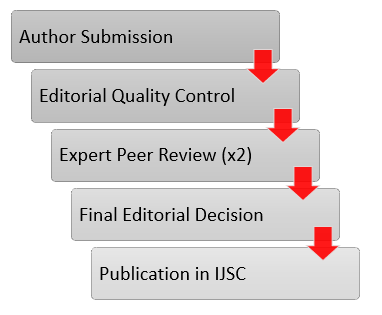Peer Review Process
The International Journal of Strength and Conditioning (IJSC) employs a rigorous open peer review process to ensure transparency, accountability, and academic integrity. This process fosters constructive dialogue between authors and reviewers, enhancing the quality of published research.
Peer Review Overview
Peer Review Workflow
-
Initial Manuscript Evaluation:
- Manuscripts are assigned to a member of the Editorial Team who carry out initial screening to assess alignment with the journal’s scope, adherence to submission guidelines, and overall quality.
- Submissions that do not meet basic standards may be returned to authors for revision or declined.
-
Selection of Reviewers:
- Manuscripts that pass the initial evaluation are assigned to at least two expert reviewers with subject-matter expertise.
- Reviewers are selected based on their qualifications, experience, and absence of conflicts of interest. The editorial board may recommend reviewers, and selections are further supported through verified academic databases and previous reviewing experience in the field of sport science and strength and conditioning.
-
Open Peer Review:
- The IJSC uses an open peer review system, where both authors and reviewers are aware of each other’s identities.
- This model encourages constructive feedback and promotes accountability.
-
Reviewer Reports:
- Reviewers evaluate manuscripts for originality, methodology, contribution to the field, results, and discussion.
- Recommendations may include:
- Accept without revision
- Accept with minor revisions
- Revise and resubmit
- Reject
-
Editorial Decision:
- The editorial team reviews the reviewers’ comments and makes a decision on the manuscript.
- Authors are provided with the reviewers’ feedback and detailed guidance for revisions, if applicable.
-
Revision and Resubmission:
- Authors are expected to address reviewer comments in a revised manuscript, accompanied by a response letter.
- Revised manuscripts are reviewed by the editorial team and, if necessary, the original reviewers.
-
Decision:
- Once all revisions are deemed satisfactory, the manuscript is recommended for publication.
- If the required revisions are not adequately addressed, the manuscript may be rejected.
Final Decision
After the peer review process is complete, the Editor-in-Chief makes the final decision regarding the manuscript. The editor will consider the reviewer feedback and make a decision based on the manuscript's scientific quality, relevance to the field, and adherence to ethical guidelines.
The editorial team will communicate the decision to the author(s), including any necessary revisions or final acceptance.
Plagiarism Detection
To maintain the integrity of the research published in IJSC, all manuscripts undergo plagiarism screening. We use recognized plagiarism detection tools, such as Turnitin or similar services, to identify any instances of plagiarism. Authors are required to submit original work, and any content taken from other sources must be appropriately cited or quoted. Submissions found to contain plagiarized material will be rejected, and the author(s) will be informed of the specific issues.
Ethical Guidelines for Reviewers
Reviewers play a vital role in maintaining the journal’s standards. They are expected to adhere to the following ethical principles:
- Confidentiality: Treat all manuscripts as confidential and do not share or discuss them without permission.
- Objectivity: Provide constructive, evidence-based feedback free of personal bias.
- Timeliness: Complete reviews within the agreed-upon timeframe.
- Conflict of Interest: Disclose any potential conflicts and recuse themselves if necessary.
- Plagiarism Reporting: Report any suspected plagiarism or ethical concerns to the editorial team immediately.
Reviewers are required to adhere to strict confidentiality and conflict of interest guidelines. Manuscripts must be reviewed objectively, and reviewers are prohibited from sharing the content of a manuscript or using the data for personal gain. Any potential conflicts of interest, such as professional, financial, or personal relationships, must be disclosed prior to agreeing to review a manuscript.
Reviewers are encouraged to provide constructive and actionable feedback to help authors improve their work, ensuring that the final published article represents the highest academic standards.
For more information, see the COPE Ethical Guidelines for Peer Reviewers.
Reviewer Recognition
The IJSC values the contributions of its reviewers and recognizes their efforts through:
- Acknowledgment in annual journal issues.
- Opportunities for professional development.
- Invitations to join the editorial board for outstanding reviewers.
Process for Unsuccessful Manuscripts
If a manuscript is rejected or requires significant revisions, the editorial team provides detailed feedback to the author(s). This feedback will explain the reasons for rejection and offer suggestions for improving the manuscript. If revisions are requested, the authors can make the necessary changes and resubmit the manuscript for re-evaluation.
In cases of rejection, the authors are encouraged to revise the manuscript and submit it to other journals. If the manuscript is resubmitted, it will undergo a new round of peer review.
Appeals Process
Authors have the right to appeal editorial decisions. Appeals must be submitted in writing and include:
- A detailed response to the reviewers’ and editors’ comments.
- Additional evidence or revised sections to support the appeal.
Appeals are reviewed impartially by the editor-in-chief or a senior editorial board member. All appeal decisions are final. For assistance, contact the editorial office at journal@iusca.org.
Publication Timeline
The IJSC is committed to timely publication while ensuring rigorous review standards. The typical timeline is:
- Initial Evaluation: 1 week.
- Review Phase: Approximately 6-12 weeks.
- Revisions and Copyediting: 6–12 weeks.
- Total Time from Submission to Publication: 12–25 weeks.



